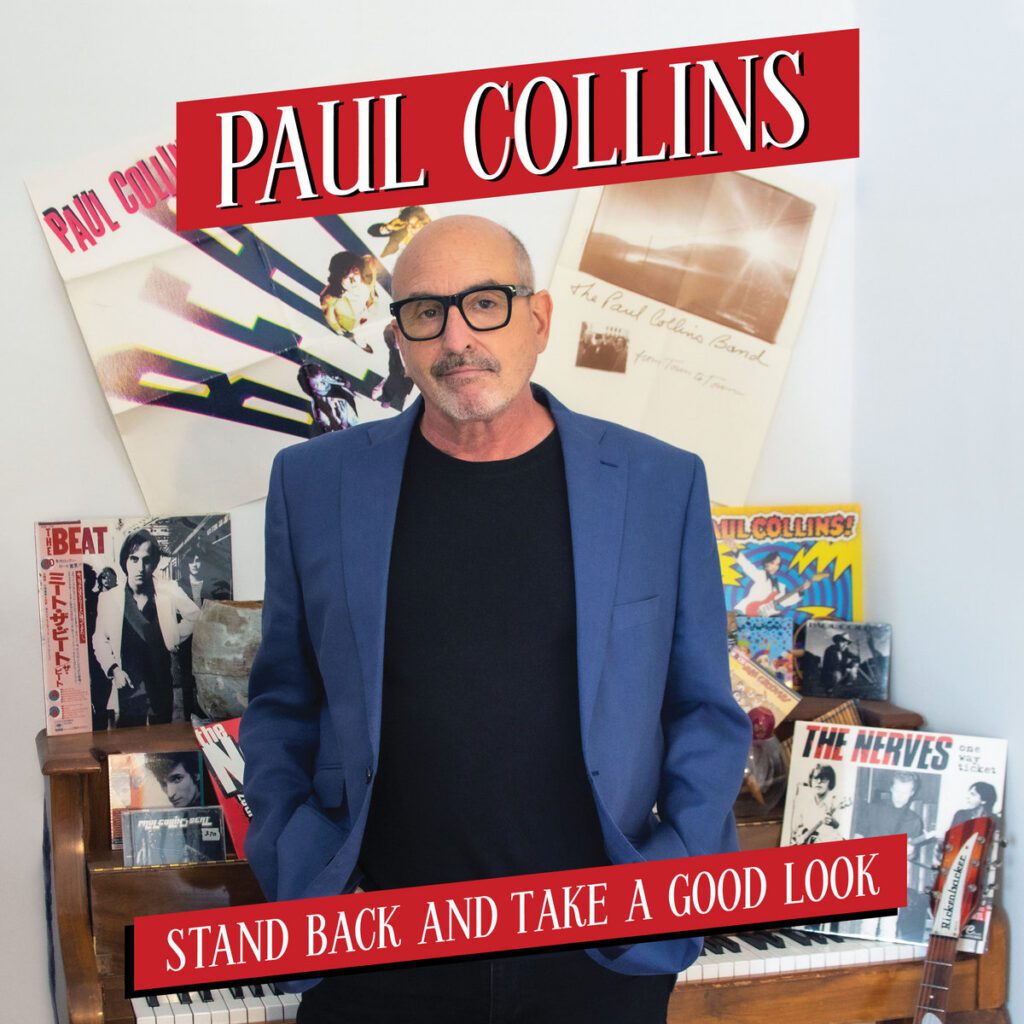Paul Collins is power pop royalty. This is not a controversial statement, as he was a member of The Nerves and The Breakaways, the leader of The Beat (the Cali band, not the contemporaneous UK ska act), and a solo artist who released the 2010 set King of Power Pop! The man could’ve sported a crown on the cover of that LP (a la Joe Carrasco) and nobody, not even the crustiest of curmudgeons, would’ve questioned the choice of chapeau. Collins’ latest, Stand Back and Take a Good Look, extends his formal mastery across 12 tracks with a few sly stylistic detours. It’s out February 16 through Jem Records.
Indeed, Paul Collins is fully aware that in power pop terms, he’s one of the greatest to ever do it, but his latest reinforces that he operates from a mindset of always having something to prove. The opening title track here, written by Collins’ bandmate in The Nerves Jack Lee (also the writer of “Hanging on the Telephone”), bursts out of the gate with bright full-bodied vocals right up front, plus hooky guitar and sturdy rhythmic propulsion.
“Stand Back and Take a Good Look” connects like a radio hit from the late 1970s, specifically a song picked up for rotation by DJs back when DJs still picked the tunes. This fits Collins’ MO, as “Hanging on the Telephone” was something of a radio hit for The Nerves, and also in the US for Blondie, who gave it a timely cover. But at just a smidge over two minutes the title cut here is just as notable for its brevity; the song’s an attention grabber, and Collins and his distinguished company (Dwight Twilley, Shoes, 20/20, Richard X Heyman, Prairie Prince, Ronnie Barnett) don’t squander the song’s power.
“I’m the Only One for You” is even more succinct while still connecting as a robust, harmony and riff laden nugget. But “In Another World” stretches out like a classic radio single, delivering some glorious chime pop harkening back to the era when it was first perfected. That’d be the 1960s, and the following cut “Don’t Take It So Hard” deepens Collins’ relationship to the decade, slowing the pace and hitting a bit like Bobby Fuller with Duane Eddy on his mind.
Collins, who is strong of voice and plays rhythm guitar on this record, also wrote (or collaborated) on most of the dozen songs here, but “Will You Come Through?” was composed by his other bandmate in The Nerves (and The Breakaways), Peter Case. To call it Beatles influenced is totally fair, but it’s reminiscent of the band in a very Knickerbockers sorta way.
“Will You Come Through?” is a swell lead-in to “Liverpool,” the chime-poppiest (downright harpsichord-like) cut on the album. Impressively, while clearly a tribute to the outfit that set so much subsequent power pop action into motion, it doesn’t particularly sound like The Beatles (it actually inspired thoughts of Robert Pollard with The Move on his mind).
“Under the Spanish Sun” doesn’t leave the chime behind but regains some of that Fuller-esque mojo, and that’s sweet. And is that an Orbison-ish undercurrent? It’s ambiguous, which makes it all the sweeter. “You Can’t Go Back” is a Byrds-ian country-rocker (with a little Doug Sahm in there, too), and “How Will I Know?” brandishes influences ranging from surf guitar to the Everley Brothers, but does so subtly, reinforcing the record’s overall deftness of execution.
“That’s When I Think of You” has a Southern pop sensibility, resonating like a one-off single cut in the mid-’60s for some fly-by-night label only to rediscovered decades hence and promptly anthologized. When the guitars kick in, the contemporaneousness of the endeavor is made plain, but without lessening the appeal.
Written by Collins’ brother Patrick, “One Hill and I’m Home” begins as a folky strummer, while keeping some of that Southern flavor. Adding piano to the mix, “Westbound” struts directly in heartland rock territory, injecting Stand Back and Take a Good Look with an ’80s aura for the close. As on his prior albums, Collins has dished up a platter full of growers, which is a necessity in power pop terms. The reign of the king continues.
GRADED ON A CURVE:
A-
